状语从句3
when引导的三种状语从句

when引导的三种状语从句
以when引导的三种状语从句:
1. 时间状语从句
当我们谈论过去的事情时,我们可以使用时间状语从句来描述事件发生的时间。
例如:
当我还是个孩子的时候,我喜欢在公园里玩耍。
当我去年去旅行的时候,我遇到了一个有趣的人。
当我刚刚开始学习钢琴的时候,我觉得非常困难。
2. 条件状语从句
当我们谈论假设或条件时,我们可以使用条件状语从句来表达。
例如:
当你来的时候,我会给你一份礼物。
当天气好的时候,我们可以去爬山。
当你学会了这个技能的时候,你就可以找到一份好工作。
3. 原因状语从句
当我们谈论原因或理由时,我们可以使用原因状语从句来解释为什么某件事情发生。
例如:
当我听到这个消息的时候,我感到非常震惊。
当他知道我生病的时候,他立刻给我打电话。
当我看到那个小狗被遗弃的时候,我决定带它回家。
这些是以when引导的三种状语从句的例子。
时间状语从句用来描述事件发生的时间,条件状语从句用来表达假设或条件,原因状语从句用来解释为什么某件事情发生。
这些状语从句可以帮助我们更准确地表达我们的意思,并使我们的句子更加丰富和有趣。
史上最全状语从句知识点总结,建议收藏!
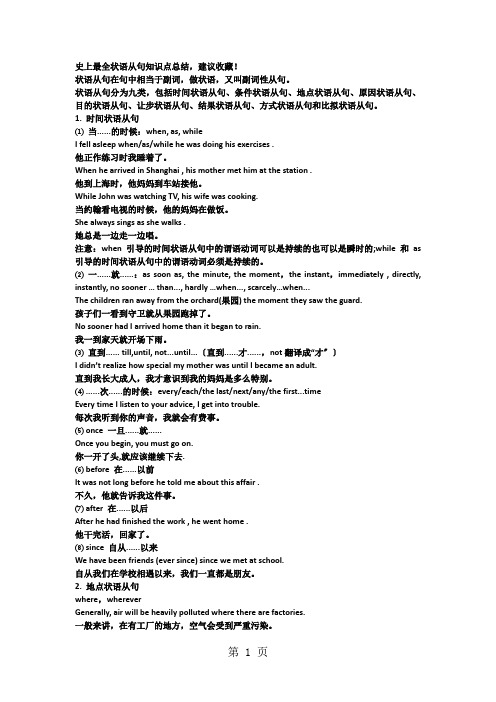
史上最全状语从句知识点总结,建议收藏!状语从句在句中相当于副词,做状语,又叫副词性从句。
状语从句分为九类,包括时间状语从句、条件状语从句、地点状语从句、原因状语从句、目的状语从句、让步状语从句、结果状语从句、方式状语从句和比拟状语从句。
1. 时间状语从句⑴当......的时候:when, as, whileI fell asleep when/as/while he was doing his exercises .他正作练习时我睡着了。
When he arrived in Shanghai , his mother met him at the station .他到上海时,他妈妈到车站接他。
While John was watching TV, his wife was cooking.当约翰看电视的时候,他的妈妈在做饭。
She always sings as she walks .她总是一边走一边唱。
注意:when 引导的时间状语从句中的谓语动词可以是持续的也可以是瞬时的;while和as 引导的时间状语从句中的谓语动词必须是持续的。
⑵一......就......:as soon as, the minute, the moment,the instant,immediately , directly, instantly, no sooner … than..., hardly …when..., scarcely…when...The children ran away from the orchard(果园) the moment they saw the guard.孩子们一看到守卫就从果园跑掉了。
No sooner had I arrived home than it began to rain.我一到家天就开场下雨。
⑶直到...... till,until, not...until...〔直到......才......,not翻译成“才〞〕I didn’t realize how special my mother was until I became an adult.直到我长大成人,我才意识到我的妈妈是多么特别。
十二种状语从句分类

十二种状语从句分类作为语文学习中必不可少的一部分,状语从句是我们必须深入学习的内容。
根据其功能和用途的不同,状语从句又可以分为很多不同的类型。
在这篇文章中,我们将详细地介绍十二种状语从句的分类及其用法。
一、时间状语从句时间状语从句表示主句所描述的动作或状态发生的时间,通常由when、while、as、before、after、until、once、since等词引导,例如:When I was young, I used to play football with my friends every weekend.While he was walking along the street, he suddenly remembered he had left his phone at home.As soon as I finished my homework, I went to bed.Before she went to work, she had breakfast with her family.After I finish this essay, I will take a break.Until he apologized, we couldn't make up.Once you start doing exercise regularly, you will feel much better.Since we arrived here, we have been exploring the city.二、地点状语从句地点状语从句表示主句所描述的动作或状态发生的地点,通常由where、wherever等词引导,例如:I still remember the restaurant where we had our first date.Wherever you go, I will follow you.三、原因状语从句原因状语从句表示主句所描述的动作或状态的原因,通常由because、since、as、now that等词引导,例如:Because he was tired, he decided to stay at home tonight.Since it started raining heavily, we decided to cancel the picnic.As he was driving too fast, he was stopped by the police.Now that you are here, we can start the meeting.四、方式状语从句方式状语从句表示主句所描述的动作或状态的方式,通常由as、as if等词引导,例如:He swept the floor as if he had done it many times before.We should learn to speak English as fluently as native speakers.五、条件状语从句条件状语从句表示主句所描述的动作或状态的条件,通常由if、unless、provided that等词引导,例如:If it rains tomorrow, we will stay at home.Unless you hurry up, we will miss the bus.Provided that you finish your work on time, you can take a day off.六、目的状语从句目的状语从句表示主句所描述的动作或状态的目的,通常由in order that、so that、that等词引导,例如:We turned on the lights so that we could see clearly.I'm taking this course in order that I can improve my writing skills.I'm studying hard so that I can get a good grade.七、结果状语从句结果状语从句表示主句所描述的动作或状态的结果,通常由so that、such that等词引导,例如:We worked so hard that we finished the project ahead of schedule.He played so well that he won the championship.The problem was such that we couldn't solve it on our own.八、让步状语从句让步状语从句表示主句所描述的动作或状态与条件相反,通常由although、though、even though、in spite of the fact that等词引导,例如:Although it is raining, she still went to the gym.Though he is young, he is very talented.Even though I was very tired, I stayed up late to finish my work.In spite of the fact that he studied hard, he got a low grade.九、比较状语从句比较状语从句表示主句所描述的动作或状态与另一个事物进行比较,通常由than、as、just as等词引导,例如:She is taller than her sister.He can run as fast as a cheetah.Just as we arrived at the train station, the train left.十、方式状语从句方式状语从句表示主句所描述的动作或状态的方式,通常由like、as if、as though等词引导,例如:She talks like she knows everything.He acts as if he is the boss.He looks as though he hasn't slept for days.十一、转折状语从句转折状语从句表示主句所描述的动作或状态与另一个事物相反或出现了意料之外的情况,通常由while、whereas、though等词引导,例如:While she is good at math, he is better at English.Whereas he prefers coffee, she likes tea.Though he is rich, he doesn't like to show off his wealth.十二、假设状语从句假设状语从句表示主句所描述的动作或状态在某种条件下才可能成立,通常由if、suppose等词引导,例如:If I were you, I would take the train instead of driving.Suppose it rains tomorrow, what will we do?以上就是十二种状语从句的分类及其用法。
when引导的三种状语从句
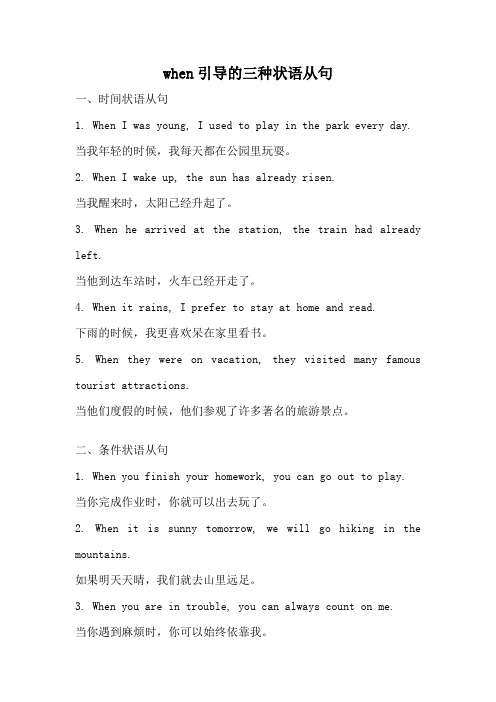
when引导的三种状语从句一、时间状语从句1. When I was young, I used to play in the park every day.当我年轻的时候,我每天都在公园里玩耍。
2. When I wake up, the sun has already risen.当我醒来时,太阳已经升起了。
3. When he arrived at the station, the train had already left.当他到达车站时,火车已经开走了。
4. When it rains, I prefer to stay at home and read.下雨的时候,我更喜欢呆在家里看书。
5. When they were on vacation, they visited many famous tourist attractions.当他们度假的时候,他们参观了许多著名的旅游景点。
二、条件状语从句1. When you finish your homework, you can go out to play.当你完成作业时,你就可以出去玩了。
2. When it is sunny tomorrow, we will go hiking in the mountains.如果明天天晴,我们就去山里远足。
3. When you are in trouble, you can always count on me.当你遇到麻烦时,你可以始终依靠我。
4. When it rains heavily, we have to stay indoors.当下大雨时,我们不得不呆在室内。
5. When you have time, please call me.当你有时间的时候,请给我打电话。
三、原因状语从句1. When the weather is hot, people like to eat ice cream to cool down.当天气炎热时,人们喜欢吃冰淇淋来降温。
中考英语状语从句用法分类详解 (3)

中考英语状语从句用法分类详解中考英语状语从句用法分类详解一、状语从句的概念用来修饰主句中的动词,副词和形容词的从句叫状语从句。
二、状语从句的分类根据其含义状语从句可分为时间状语从句,地点状语从句,条件状语从句,原因状语从句,结果状语从句,比较状语从句,目的状语从句,让步状语从句。
三、状语从句的句法功能1. 时间状语从句(主句将来时从句现在时)1)时间状语从句常用when, as, while, before, after, since, till, until, as soon as等连词来引导。
例如:It was raining hard when got to school yesterday.While he was doing his homework, the telephone rang.As he walked along the lake, he sang happily.He had learned a little Chinese before he came to China.After he finished middle school, he went to work in a factory.易混引导词while, when的区别:when既可以指"时间点",与瞬间动词连用,也可以指"时间段",与延续性动词连用(=while)。
While表示时间段,因此,while 从句的谓语动词要用延续性动词。
练习:用while或when填空1. Please don't talk so loud ______ others are working.2. ______ he came in, his mother was cooking.3. ______ we were at school, we went to the library every day.Keys: 1. while 2. when 2. While2)在时间状语从句里,通常不用将来时态,用现在时态表示将来的动作或状态。
3-状语从句讲解
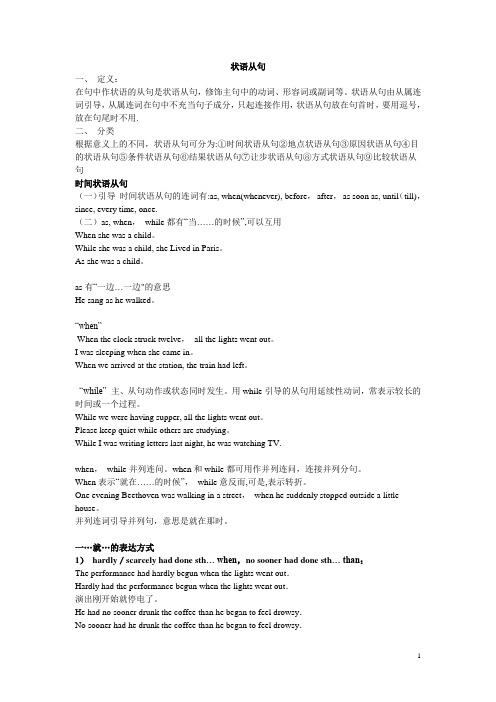
状语从句一、定义:在句中作状语的从句是状语从句,修饰主句中的动词、形容词或副词等。
状语从句由从属连词引导,从属连词在句中不充当句子成分,只起连接作用,状语从句放在句首时,要用逗号,放在句尾时不用.二、分类根据意义上的不同,状语从句可分为:①时间状语从句②地点状语从句③原因状语从句④目的状语从句⑤条件状语从句⑥结果状语从句⑦让步状语从句⑧方式状语从句⑨比较状语从句时间状语从句(一)引导时间状语从句的连词有:as, when(whenever), before,after,as soon as, until(till),since, every time, once.(二)as, when,while都有“当……的时候”,可以互用When she was a child。
While she was a child, she Lived in Paris。
As she was a child。
as有“一边…一边"的意思He sang as he walked。
“when”When the clock struck twelve,all the lights went out。
I was sleeping when she came in。
When we arrived at the station, the train had left。
“while” 主、从句动作或状态同时发生。
用while引导的从句用延续性动词,常表示较长的时间或一个过程。
While we were having supper, all the lights went out。
Please keep quiet while others are studying。
While I was writing letters last night, he was watching TV.when,while并列连问。
when和while都可用作并列连问,连接并列分句。
4.初中语法状语从句 (3)
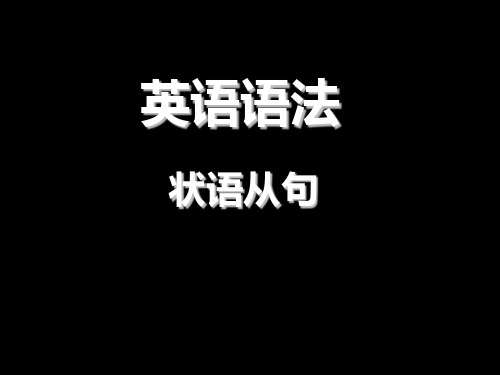
• (2)在……条件下:in case, on condition that, provided (that), supposing, suppose (that), as long as
• 例: • Providing I get my father’s permission, I’ll go! • (只要得到父亲的同意,我就去)
• ____________, I have to put it away and focus my attention on study this week. • A. However the story is amusing • B. No matter amusing the story is • C. However amusing the story is • D. No matter how the story is amusing
• • • • A. because B. before C. whether D. unless
辨析:两种since的句型
• (1)It be time since+非延续性动词 • 例:They have been friends since they met for the first time in London.
• while强调“在……的同时” • as强调“伴随”的状态 • Tom fell asleep while Jerry was giving a lecture
时间状语从句的破题方法
1. 读题,寻找时间线索
2. 判断主句和从句动作的延续性 非延续性动词when
3. 判断两个动作在时间上的关系 同时while 伴随as
扩展练习
• (2008上海春季)_____ this is only a small town, it’s crowded with tourists who come here all year round.
整理后带答案状语从句3
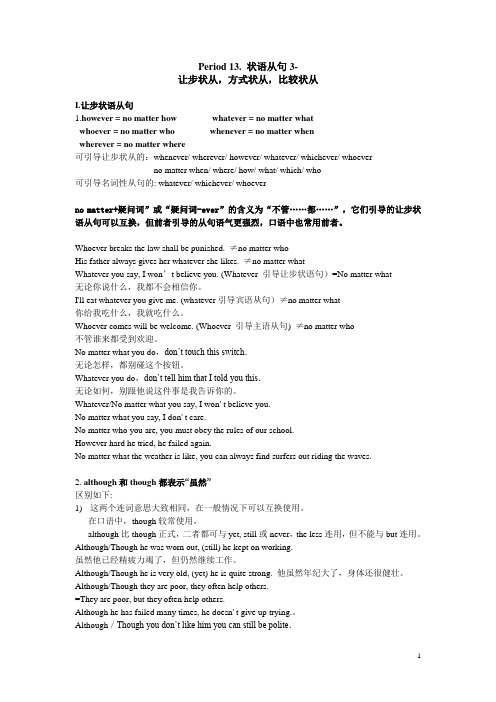
Period 13. 状语从句3-让步状从,方式状从,比较状从I.让步状语从句1.however = no matter how whatever = no matter whatwhoever = no matter who whenever = no matter whenwherever = no matter where可引导让步状从的:whenever/ wherever/ however/ whatever/ whichever/ whoeverno matter when/ where/ how/ what/ which/ who可引导名词性从句的: whatever/ whichever/ whoeverno matter+疑问词”或“疑问词-ever”的含义为“不管……都……”,它们引导的让步状语从句可以互换,但前者引导的从句语气更强烈,口语中也常用前者。
Whoever breaks the law shall be punished. ≠no matter whoHis father always gives her whatever she likes. ≠no matter whatWhatever you say, I won’t believe you. (Whatever 引导让步状语句)=No matter what无论你说什么,我都不会相信你。
I'll eat whatever you give me. (whatever引导宾语从句)≠no matter what你给我吃什么,我就吃什么。
Whoever comes will be welcome. (Whoever 引导主语从句) ≠no matter who不管谁来都受到欢迎。
No matter what you do,don’t touch this switch.无论怎样,都别碰这个按钮。
Whatever you do,don’t tell him that I told you this.无论如何,别跟他说这件事是我告诉你的。
考研英语语法 状语从句(3)
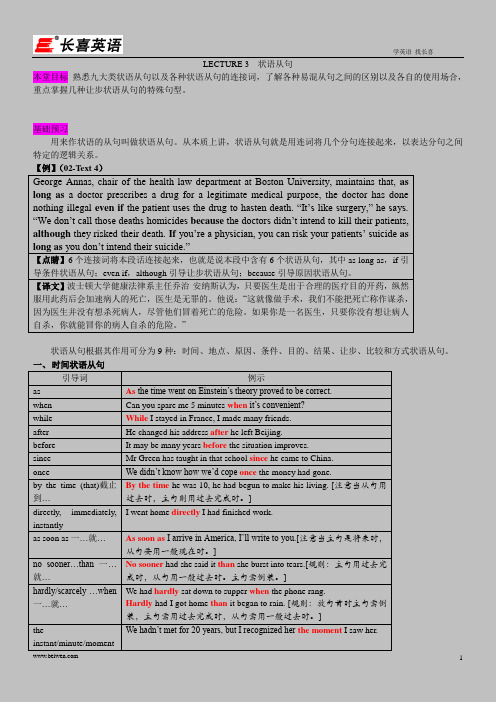
LECTURE 3 状语从句本堂目标熟悉九大类状语从句以及各种状语从句的连接词,了解各种易混从句之间的区别以及各自的使用场合,重点掌握几种让步状语从句的特殊句型。
基础预习用来作状语的从句叫做状语从句。
从本质上讲,状语从句就是用连词将几个分句连接起来,以表达分句之间特定的逻辑关系。
【例】(02-T ext 4)George Annas, chair of the health law department at Boston University, maintains that, aslong as a doctor prescribes a drug for a legitimate medical purpose, the doctor has donenothing illegal even if the patient uses the drug to hasten death. “It’s like surgery,” he says.“We don’t call those deaths homicides because the doctors didn’t intend to kill their patients,although they risked their death. If you’re a physician, you can risk your patients’ suicide aslong as you don’t intend their suicide.”【点睛】6个连接词将本段话连接起来,也就是说本段中含有6个状语从句,其中as long as,if引导条件状语从句;even if,although引导让步状语从句;because引导原因状语从句。
【译文】波士顿大学健康法律系主任乔治·安纳斯认为,只要医生是出于合理的医疗目的开药,纵然服用此药后会加速病人的死亡,医生是无罪的。
状语从句知识点详解(初中英语专项复习)3
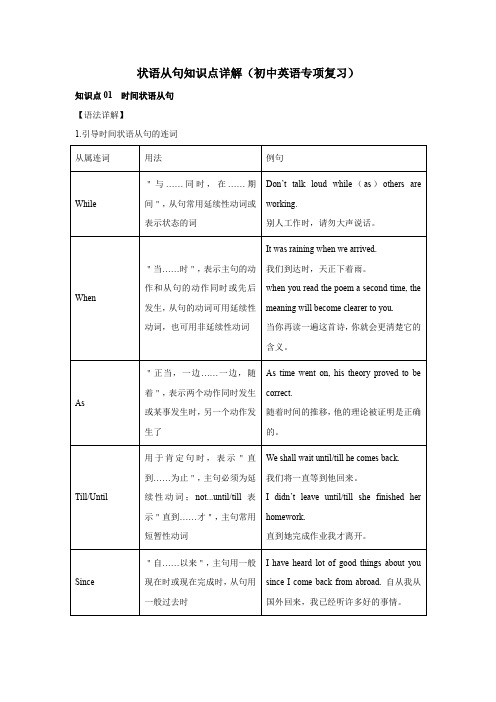
状语从句知识点详解(初中英语专项复习)知识点01 时间状语从句【语法详解】1.引导时间状语从句的连词时间状语从句的时态问题:在时间状语从句和条件状语从句中,主句如果使用一般将来时态,从句使用一般现在时表示将来,即所谓的"主将从现"。
As soon as I arrive in Beijing, I will ring you up. 我一到北京就给你打电话。
You’ll fall behind the others unless you study hard. 如果你不努力学习,你将会落后于其他人。
2. when,while,as引导时间状语从句的区别when,while,as显然都可以引导时间状语从句,但用法区别非常大。
① when可以和延续性动词连用,也可以和短暂性动词连用;而while和as只能和延续性动词连用。
Why do you want a new job when you’ve got such a good one already?你已经找到如此好的工作,为何还想再找新的?(get为短暂性动词)Sorry, I was out when you called me.对不起,你打电话时我刚好外出了。
(call为短暂性动词)Strike while the iron is hot.趁热打铁。
(is为延续性动词,表示一种持续的状态)The students took notes as they listened.学生们边听课边做笔记。
(listen为延续性动词)① when从句的谓语动词可以在主句谓语动作之前、之后或同时发生;while和as从句的谓语动作必须是和主句谓语动作同时发生。
a. 从句动作在主句动作前发生,只用when。
When he had finished his homework, he took a short rest. (finished先发生)当他完成作业后,他休息了一会儿。
高中英语语法:状语从句篇
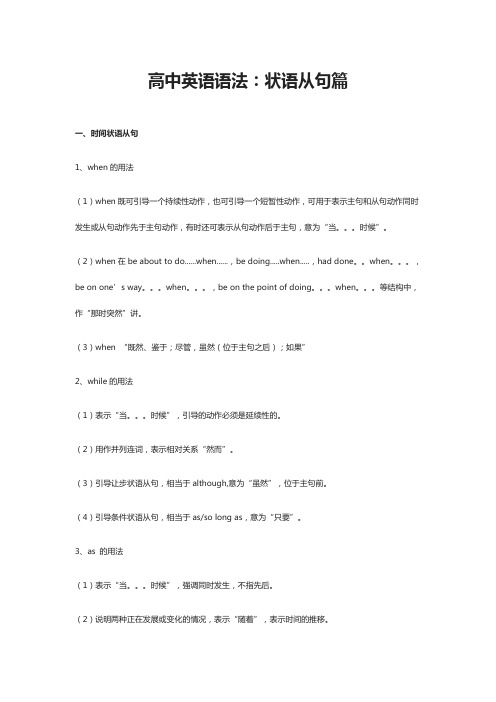
高中英语语法:状语从句篇一、时间状语从句1、when的用法(1)when既可引导一个持续性动作,也可引导一个短暂性动作,可用于表示主句和从句动作同时发生或从句动作先于主句动作,有时还可表示从句动作后于主句,意为“当。
时候”。
(2)when在be about to do......when......,be doing.....when.....,had done。
when。
,be on one’s way。
when。
,be on the point of doing。
when。
等结构中,作“那时突然”讲。
(3)when “既然、鉴于;尽管,虽然(位于主句之后);如果”2、while的用法(1)表示“当。
时候”,引导的动作必须是延续性的。
(2)用作并列连词,表示相对关系“然而”。
(3)引导让步状语从句,相当于although,意为“虽然”,位于主句前。
(4)引导条件状语从句,相当于as/so long as,意为“只要”。
3、as 的用法(1)表示“当。
时候”,强调同时发生,不指先后。
(2)说明两种正在发展或变化的情况,表示“随着”,表示时间的推移。
(4)强调两个动作紧接着发生。
(5)表示“虽然,尽管”。
(6)其他含义“正如,正像”,“作为”,“由于,因为”。
4、before的用法(1)一般意为“在。
之前”“。
才”,“。
就”“还没有。
”“免得”“不知不觉”“宁可,宁愿”,“否则,要不然”。
(2)It + will be/was + 时间段+before+一般现在时/一般过去时。
在肯定句中,意为“多长时间之后才”;在否定句中,意为“用不了多长时间就”。
5、until和till(1)与肯定句连用,必须是延续性动词。
(2)与否定句连用,必须是非延续性动词,表示“直到。
才,在。
之前不。
”。
注意:not until可用于强调句和倒装句强调句:It is/was not until…that…倒装句:not until 放句首时,主句要部分倒装。
状语从句3

2. 比较: when: (1) 从句动作和主句动作发生在相同时间 I was doing my homework when you came back. (2) 表示原因“既然”,相当于since; considering that
It was foolish of you to take a taxi when you could easily walk there in five minutes .
while: (1) 从句动作和主句动作长时间的同时进行或两 种态同时存在 He visited a lot of places while he was traveling.
While we were cleaning the window, they were sweeping the floor. (2) 做并列连词表示前后相反成为对比 Some people are fat while others are thin. (3) while可表示尽管,相当于although
It was (not) long before they drove the
enemy out of their country. Before I had a chance to speak to him, he had left.
It is not till/until… that… 直到…才…
1.连词: 目的: 结果: that, so that, in order that , lest, in case, that, so…that, such…that
for fear that (以防) 注: 目的状语从句的谓语里常有 can, could, may, might, will, would 等 2.比较: I’ll speak slowly so that you can understand me. He spoke slowly so that I understood him.
状语从句(9种全)
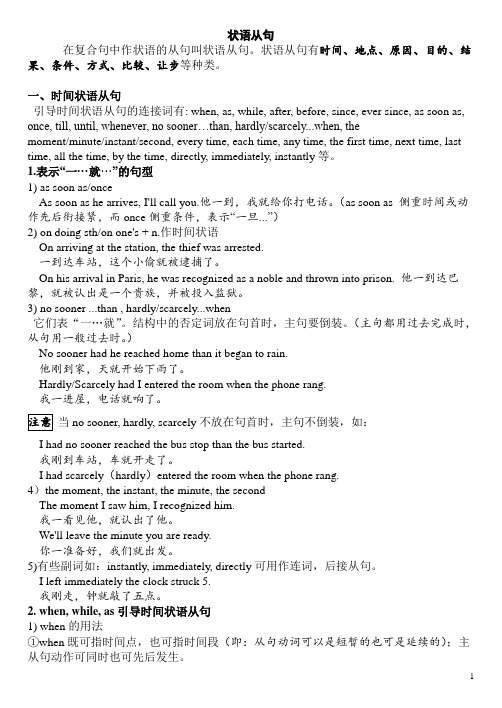
状语从句在复合句中作状语的从句叫状语从句。
状语从句有时间、地点、原因、目的、结果、条件、方式、比较、让步等种类。
一、时间状语从句引导时间状语从句的连接词有: when, as, while, after, before, since, ever since, as soon as, once, till, until, whenever, no sooner…than, hardly/scarcely...when, themoment/minute/instant/second, every time, each time, any time, the first time, next time, last time, all the time, by the time, directly, immediately, instantly等。
1.表示“一···就···”的句型1) as soon as/onceAs soon as he arrives, I'll call you.他一到,我就给你打电话。
(as soon as 侧重时间或动作先后衔接紧,而once侧重条件,表示“一旦...”)2) on doing sth/on one's + n.作时间状语On arriving at the station, the thief was arrested.一到达车站,这个小偷就被逮捕了。
On his arrival in Paris, he was recognized as a noble and thrown into prison. 他一到达巴黎,就被认出是一个贵族,并被投入监狱。
3) no sooner ...than , hardly/scarcely...when它们表“一…就”。
结构中的否定词放在句首时,主句要倒装。
第三条件状语从句
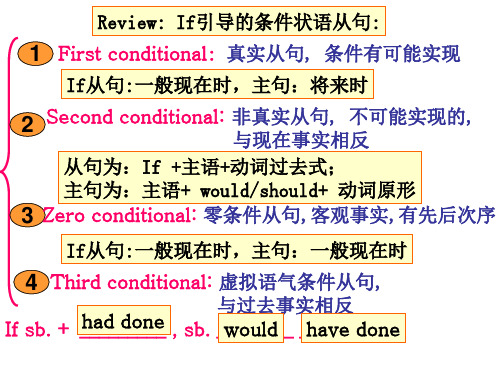
4. If we _________ had met (meet) each other the other day, I would have had (have) a heart-to-heart talk with ________________
you. had been___________ would have seen ________________(see) the famous movie star.
article. Find and underline them in the text. 1.If you don’t want to fall behind in today’s competitive job market, you have to commit yourself to life-long learning.
Conditional 1 (真实从句)& conditional 2 (非真实从句).
2. 1 If I have time to buy the butter and flour and everything, I’ll make you a cake . 3.Yes, if my parents weren’t both at work all day, 2 we would get a dog.
2. If you invest time in developing your study skills now, you’ll be enjoying the rewards for the rest of your life.
3.If I were you, I would ask the teacher.
4. 2 Well, if I saved all my pocket money, I still wouldn’t have enough for an expensive present.
条件状语从句3
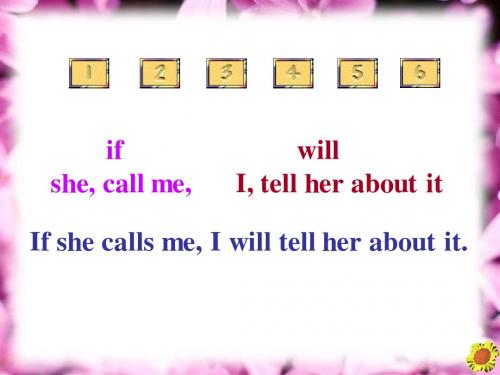
will I, tell her about it
If she calls me, I will tell her about it.
he ,come, next weekend,
I ,tell you
If he comes next weekend, I will tell you.
she, study hard, she, get good grades If she studies hard, she will get good grades.
he,have free time, go to Shanghai ,
If he has free time, he will go to Shanghai.
1.The students will go to the park doesn’t rain if it __________(not rain) tomorrow. 2.If he _______(walk) to school, he’ll be walks late. 3.If she likes it, she_________ (read) it will read soon. 4.If you play computer games on weekdays, you ______(be) tired. will be goes 5. If he ______(go) to the movies, he won’t finish his work.
Grammar
if “如果, 假如” 引导一个条件状 语从句。要求主句用一般将来时 态,从句用一般现在时态。
Eg: If it rains (rain), he will stay (stay) at home.
上海高三春考备考语法(状语从句) (3)

决不可用will come back)三、专题过关一、专题知识梳理状语从句考点一.时间状语从句1.when / while / as<1> when引导的从句中既可以是可延续的v,也可以是非可延续的v.eg : I’ll phone you again when I get home.The telephone rang when I was sleeping.<2> while引导的从句中只能为可延续的v,还表示两个动作同时发生具有对比的意味,主从时态相同.eg:I wonder what happened while I was sleeping.While I played the computer, my sister did her homework.<3> as 引导的从句中既可以是可延续的v,也可以是非可延续的v.★表示发展变化的情况eg: As time passed, things seemed to get better.★表示“一边…一边…”eg:As he was reading, he was shaking his head.2.until / till<1> until=till,指某一持续的动作持续到某一时间点为止。
eg:I worked as a worker until / till 2008.<2> not until “直到…才…”,放在句首时主句倒装。
eg:Not until I found a secure job did I own a car.3. since<1> 主句现在时,从句过去时。
eg:Great changes have taken place since you left this city.↓ ↓现在完成时一般过去时<2> It is / has been + 一段时间+ since + 过去的时间点eg: It is / has been a long time since we parted.4. before“…才…” It is a long time before…eg: It was a long time before people got the flood under control.It will be a long time before we meet again.5.引导时间状从的n短语,如the moment,the day,the time,the first time,each time,by the time,next time,其后不再加when。
初中英语语法知识—状语从句的图文解析(3)

一、选择题1.Mr. White tells us the calls meeting will be cancelled if no agreement _________ tomorrow. A.is reached B.will be reachedC.is going to be reached D.has been reached2.Jenny often eats a lot of fruit andvegetables_______she knows they are good for health.A.because B.but C.or3.You can stay healthy________you exercise every day.A.as long as B.so C.as soon as4.He offered________valuable suggestions ________ few people disagreed.A.such, that B.very, that C.so, that D.too, that5.If it ________ tomorrow, we ________ to have a picnic at the lake.A.doesn’t rain; go B.won’t rain; will goC.doesn’t rain; will go D.won’t rain; go6.I don’t like nuts ________ they are too hard.A.if B.after C.when D.because7.—I’m afraid I can’t finish the job in such a short time.—Don’t worry. Can you do it if you_______ two more hours.?A.give B.are given C.will give D.will be given 8.— What shall we do now?—__________ it’s raining hard, let’s stay at home.A.So B.Since C.Though D.Otherwise9.“A white elephant” means something that is useless, ___________ it may cost a lot of money. A.unless B.until C.since D.although 10.—Mum, will our trip be cancelled?—No, we won’t put it off________there is a natural disaster.A.if B.whether C.unless D.when11.—Do you think if I am suitable for this IT job?—You can’t get the job________ you have experience in the computer industry.A.if B.unless C.because D.since12.—the water was cold , Wei Qinggang jumped into it to save others.A.Although B.When C.If D.Because13.If you _______ someone, you invite them to flight or compete with you in some way. A.encourage B.challenge C.introduce14.— What should I do if I ______ behind others in my study?— You are going to work really hard to catch up with them.A.fall B.will fall C.fell15._______you can sleep well, you will lose the ability to concentrate, plan and stay active afterone or two nights.A.Once B.Unless C.If D.When16.I’ll go to visit my aunt in England the summer holidays start.A.as soon as B.since C.unless17.Our teachers have been with us for nearly three years we came to junior high school. We should thank them for what they have done for us.A.until B.before C.since D.while18.__________ what he explains to you, just don’t believe him.A.However B.Even though C.But D.No matter 19.It’s not your turn yet. Please wait on the chair until you________.A.have called B.will call C.are calling D.are called20.It was________a difficult task that nobody can finish it on time.A.so B.too C.enough D.such21.—How are you going to spend this weekend?—_________ the weather is fine, we’ll climb Mount Tai.A.As well as B.As good as C.As soon as D.As long as 22.Mr.Green doesn’t have any hobbies________ you call watching TV a hobby.A.though B.unless C.because23.My father was reading ________ I was sleeping.A.while B.when C.before D.after24.—My son hardly even eats vegetables________ it’s good for his health.— Not a good habit.A.and B.but C.so D.although25.I’ll finish the task, ________ how long it takes.A.even though B.so that C.no matter【参考答案】***试卷处理标记,请不要删除一、选择题1.A解析:A【解析】【详解】句意:怀特先生告诉我们,如果明天没有达成协议,电话会议将取消。
3状语从句讲解及专项练习(附答案)
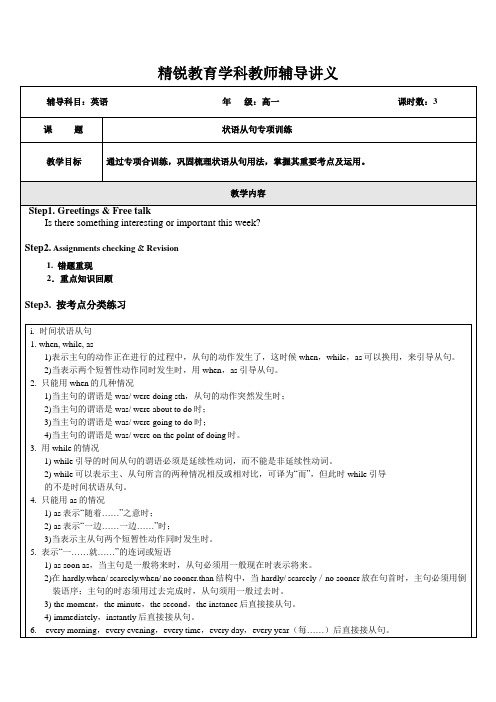
精锐教育学科教师辅导讲义7. “it was+时间点+when从句”it指时间点,时间前无介词,when从句是状语从句;当主句是一般将来时,when从句用一般现在时。
8. before1)…before.表示“没有来得及做某事就……”,主句经常用过去完成时,从句用一般过去时。
2)“it was(not)十一段时间+before从句(一般过去时)”主句是肯定句时,意为“过多长时间才……”;主句是否定句时,意为“没过多久就……”。
3)“it will be(not)十一段时间十before从句(一般现在时)”主句是一般将来时,从句要用一般现在时表示将来。
9. until1)(not)…unti l…一肯定句中主句的谓语动词必须是延续性动词;否定句中主句的谓语动词经常是非延续性动词,也可以是延续性动词。
2)It was not until…that…强调从句时需把not放在从句前面。
3) not until在句首时,主句要部分倒装。
4) until=till,但是在句首时,只能用until。
10. since1) since从句总是与时态是现在完成时的主句连用,从句用一般过去时。
2)“It is/ has been十一段时间+since从句”意为“从……到现在多久了”。
如果表示现在,主句用一般现在时或现在完成时,从句用一般过去时。
如果表示过去,主句用一般过去时,从句用过去完成时;或者主句用过去完成时,从句用一般过去时。
如果从句的谓语是延续性动词或者是表示状态的动词,所表示的时间是从该动作结束起。
3) some time has passed since.表示“从……到现在多久过去了”。
11. 时间状语从句的时态一致1)当主句是一般将来时,时间状语从句必须用一般现在时表示将来。
2)当主句是一般将来时,若时间状语从句强调动作完成,从句也可以用现在完成时。
专项练习1. A good storyteller must be able to hold his listeners' curiosity _______ he reached the end of the story.A. whenB. unlessC. afterD. until2. He transplanted the little tree to the garden ________ i t was the best time for it.A. whereB. whenC. thatD. until3. He was about to tell me the secret ________ s omeone patted him on the shoulder.A. asB. untilC. whileD. when4. ________ you understand this rule, you'll have no further difficulty.A. WhileB. OnceC. ThoughD. Unless5. Substances will expand or contract _______ heated or cooled, but this is not the case with water.A. when they will beB. if they will beC. as they beingD. when6. It will not be long ________ man can harness the solar energy and make it serve mankind.A. sinceB. beforeC. whenD. after7. It was found that although the girl could perceive things with her fingers, this ability ceased her hands were wet.A. the moment whenB. the momentC. in that momentD. before8. A man escaped from the prison last night. It was a long time _______ the guards discovered what had happened.A. beforeB. untilC. sinceD. when9. We hadn't met for 20 years, but I recognized her ________ I saw her.A. the momentB. the moment whenC. for the momentD. at the moment when10. _______ he entered the university, his English has been much improved.A. BeforeB. AfterC. WhenD. SinceA. was warned; would not takeB. had been warned; would not have takenC. would be warned; had not takenD. had warned; wouldn't have got18.It is 50 years ________ the People's Republic of China was founded.A. afterB. beforeC. whenD. since19.Not until I began to work _______ how much time I had wasted.A. didn't I realizeB. did I realizeC. I didn't realizeD. I realized20. Not until all the fish died in the river ________ how serious the pollution was.A. did the villagers realizeB. the villagers realizedC. the villagers did realizeD. didn't the villagers realizeKeys:1-5 DADBA 6-10 CADAB 11-15 BAADB 16-20 CBDBAPart 2.21. It was ______ it rained heavily that they didn't come.A. asB. becauseC. forD. since22. Why not buy a cheaper one, ______ you don't have enough money?A. sinceB. becauseC. forD. though23. It is ten years ________ I left home.A. whenB. afterC. sinceD. as24. He speaks English he speaks his mother tongue.A. so good asB. as good asC. so well asD. as well as25. Try_______ he might, he couldn't get out of difficulty.A. whenB. whereC. tillD. as26. _______ I saw the computer, I showed great interest in it.A. At firstB. For the first timeC. UntilD. The first time27. I don't think you'll be able to understand this formula(公式) you finish school.A. as ifB. only whenC. evenD. even when28. I often visited Tian An Men Square I was staying in Beijing.A. untilB. duringC. whileD. throughout29. He always thinks I'm wrong, ______ I say.A. no matter whateverB. whateverC. whatD. that30. ______ the rain has stopped, let's continue to work.A. ForB. Now thatC. ThatD. Because31. _______ , I am sure that the boy is honest.A. Whatever people sayB. No matter people sayC. What people sayD. It doesn't matter people say32. I knew Mr. Green ________ I knew Mrs. Green.A. long beforeB. before longC. long agoD. after long33. They waited ______ it was dark before leaving, they didn't want anyone to see them leave.A. since; becauseB. until; asC. unless; forD. so; because34. ______ often you ring, no one will answer.A. HowB. HoweverC. WhomD. Whenever35. I will never give up _______ they do to stop me.A. his works are not widely readB. but his works are not widely readC. however his works are not widely readD. still his works is not widely read56. _______ he came to town, he would visit our school.A. AfterB. WhenC. AsD. While57. I hurried ________ I wouldn't be late for class.A. sinceB. so thatC. as ifD. unless58. _______ he comes, we won't be able to go.A. WithoutB. UnlessC. ExceptD. Even59. It wasn't ________ the city was liberated.A. long untilB. long beforeC. long afterD. long when60. The conductor often tells the passengers not to get off the bus it has stopped.A. exceptB. unlessC. untilD. as61. Did you pay a visit _______ during the holidays?A. any placeB. anywhereC. whereD. wherever62. It was for two weeks_________ m other had been in hospital.A. sinceB. thatC. in whichD. which63. It was ________ I was in college I began to write letters in English.A. since; thatB. that; whenC. when; thatD. where; did64. I shall ring you up _______ you should forget it.A. becauseB. forC. in caseD. in order not that65. ________ it is so fine a day today, we'd better go outing and have a picnic.A. UnlessB. SinceC. WhileD. Although66. As ________ a s I know, there isn't anything left to eat.A. soonB. farC. longD. well67. The doctor in charge told the young man he didn't allow him to operate on his wounded arm, he would lose it.A. thatB. ifC. whetherD. unless68. _______ , we should try our best to protect the environment.A. Whatever people sayB. What people sayC. No matter people sayD. It doesn't matter people say69. You will succeed _______ y ou keep on working at it.A. as far asB. as long asC. as good asD. as hard as70. The machine is so old it can't be used any more some of its parts are changed.A. as; unlessB. that; unlessC. that; ifD. whether; or71. —My watch started up again.—You should have it repaired it's working now.A. sinceB. untilC. howeverD. even though72. I'm going away; _________ s he will go is up to her to decide.A. if or notB. whether or notC. howeverD. even though73. We couldn't feel air ___________ it were moving.A. as long asB. now thatC. if notD. unless74. We can't afford to buy that flat. It's expensive for us.A. too muchB. far moreC. much tooD. very too75. The moon is much closer to us _______ .A. than any other starB. than any starC. as any other starD. like other stars76. _______ to my surprise, he forgot my birthday at all.A. VeryB. MuchC. MostD. Too much77. His memory is so good _______ his brain were an advanced computer.A. as ifB. thatC. even ifD. as78. ______ you have hidden my umbrella?A. It is where thatB. Where it isC. Is it where thatD. Where is it that79. Even if _______ , I won't go to his wedding party.A. being invitedB. invitingC. invitedD. I invited80. ______ little time left, you'd better walk as fast as possible.A. BeingB. There beingC. It havingD. Since there has Keys:51-55 DBCBA 56-60 ABBBC61-65 BBCCB 66-70 BBABB 71-75 DBDCB 76-80 BADCB。
三大从句(三)状语从句
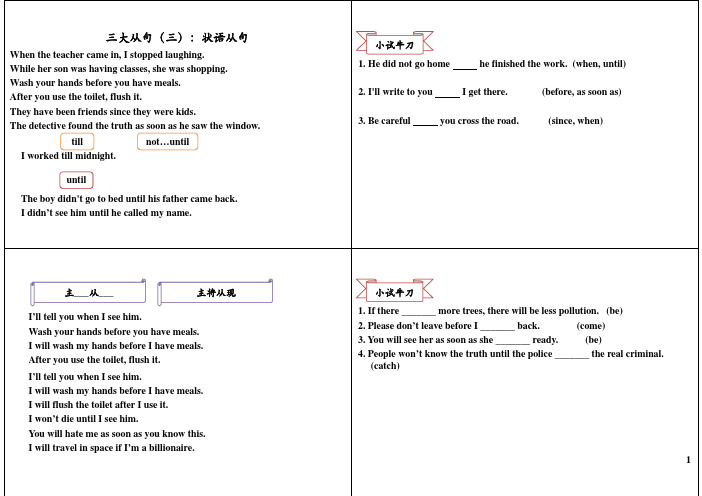
till I worked till midnight.
not…until
until
The boy didn't go to bed until his father came back. I didn’t see him until he called my name.
主___从___
主将从现
I’ll tell you when I see him. Wash your hands before you have meals. I will wash my hands before I have meals. After you use the toilet, flush it.
小试牛刀 1. 数学作业太难了,好多学生都不会。
The math homework was _____ _____ _____ many students couldn’t work it out. 2. 这是如此美好的一天,所有学生都外出了。 It was _____ _____ _____ day _____ all of the students went out. 3. 贝蒂起晚了,没赶上火车。 Betty got up so late _____ _____ _____ _____ the train.
(be)
4. People won’t know the truth until the police _______ the real criminal. (catch)
1
so…that…
The bus was so full that I could hardly get on. He is so nice that everybody likes him. He is so selfish that nobody likes him. The thief ran so quicቤተ መጻሕፍቲ ባይዱly that the policeman didn’t catch up with him.
- 1、下载文档前请自行甄别文档内容的完整性,平台不提供额外的编辑、内容补充、找答案等附加服务。
- 2、"仅部分预览"的文档,不可在线预览部分如存在完整性等问题,可反馈申请退款(可完整预览的文档不适用该条件!)。
- 3、如文档侵犯您的权益,请联系客服反馈,我们会尽快为您处理(人工客服工作时间:9:00-18:30)。
1,when 引导时间状语从句 表示 “当……地时候”
Don’t get excited when you talk .
When he comes I will tell him to fetch police .
When/whenever I makeup my mind to do something .I do it immediately .
(每)当我决心做什么事的时候,我就马上去做
Whenever we see him we speak to him.
每逢我们见到他,都同他说话.
When他可表示重复性,例如:
While I was having dinner ,she was dress upstairs.
While I was waiting I was reading.我一边等一边看书.
一个基本原则所较长的动词用过去进行体,较短的动词用一般过去时,而持续时间一样长时,则都用过去进行体(如最后两例).
The planes had been planting seed for a month when it began to rain .
从上述诸例可以看出,由于强调when分句里动作的突然性.因此,when分句里的谓语动词必须是瞬间动词,而不可能是持续动词.下面的句子可以进行一步说明这个问题.
② 状语从句
时间状语从句 地点状语从句 原因状语从句
条件状语从句 让步状语从句 方式状语从句
目的状语从句 结果状语从句 比较状语从句
②表示过去情况时,常常是从句用过去进行体,主句一般过去时.
While the water was heating ,Mr Mike began sweeping the floor .
While the discussion was going on ,he came in.
也可以主句和状语从句都用过去进行体.
When you have finished your experiment ,please tidy the lab and put everything back in the cupboards .(SBIA.p.s)
When you’ve leuned English ,you’ll find it a bridge to so much knowledge .
在这种情况下,当注意大动词使用一般现在时和现在完成时意义上存在很大差别,例如:
The audience claps when she sings 她唱完歌时观众总是鼓掌
has song她唱完歌后观众总是鼓掌
同样when从句的动词是持续性动词时,一般过去时和过去完成体在意义上也存在着同样的差别. 例如:
②他来的时候,请告诉我一下.
4,when是从属连词还是并列连词.
When分句有时并不当从属连词引导并当时间状语分句来修饰前面的主语,倒是前面的主语为when的分句提供时间背景,这类when引导的分句,是前面的叙述所没到的信息,这总是所描述的事件予以惹人注目的强调并没之达到高潮,因此翻译成汉语时,必须把这层意思表达出来.表示方法,一是将when译成 “这时” “突然”,二是把when分句译在句子的末尾这一突出重要的信息的位置.(比较: “屡战屡败”于 “屡败屡战”).例如:
他则穿戴完毕后,客人们就到了(突出信息重点)
when的这种用法,文前面的分句的动词时体大体分为三种情况.
A,用过去进行体
I was thinking of this when I heard my name called .
我正想着这件事,突然听到叫我的名字.
B, 用was(were)abou源自 to, was(were)going to , was(were) on the point of. We were to start when it began to rain .我们刚要出发,这时……
2,又请注意when引导的时间状语从句中,不可以使用将来时,但可以使用一般现在时,还在进行时,现在完成时表示将来的动作.
When you meet him .do say hello to him from me .
Take care not to mention this when you’re talking to him .
8.as表示时间关系.引导时间状语分句
在多数情况下,可与when交替使用,但是as通常不表示将来情况,另外as还常有 “随着……”的含义,具体地
1>某事一发生,另一事立即发生.例如:
He rose as I entered
As I left I remember the key
2>在某事发生的过程中,另一事发生
As she slept, she dreamed a dream.
As he was leaving ,Mr scales saw her.
3>两个动作同时发生
“I’ll call for you at nine” he said left
时间状语从句
常见的连接词有 when, while, as, before, after, since, until, till, the moment, the instant, the minute, every time, each time, the first, the last time, the second, immediately, directly,
I had not been reading for half an hour when I heard steps outside.
改错:We were about to start when it rained.
5.when与whenever
when与whenever都可以当连词用,引导状语分句,但whenever含有 “每当” “每逢”的意思.例如:
又请对比 I don’t know he will come 我不知道他什么时候到
I don’t know when he comes 我不知道他什么时候到(通常情况,故用现在时)
因此下面的句子孙有歧义的
Tell me when he comes ①告诉我他(通常情况下)什么时候到
①He was thinking about the question when an apple fell to the ground.
他正在 思考这个问题,这时(突然)一只苹果掉到地上.
②She had just finished dressing when her guests arrived .
b,每当Kose是不是爱他,她总是吁口气.
6 when与while
when和while都可以引导时间状语分句,而且意思相同,但是while从句中的动词必须是持续性的.(be stay ,wait, live等)而不能是瞬间性(arrive, come, get up, meet等),当when分句中的动词显持续性动词时.就可以用while来代替when.例如:
When he looked back ,the woman had disappeared .
John was having dinner when I saw him .
When I got up , I felt tired.
有时根据上下文,还可以表示 “在……之后”请注意下面三个句子中when的不同意思:
We must strike while the iron is hot .我们必须趁热打铁.
请做下面的选择题
_____we got up ,he felt sick .
A while B when C since D During
7 while 引导的状语分句时态特点
They walked out when I gave the lecture 我开始讲课或在我讲课时
Had given 我讲课结束后
3,请注意when是引导状语还算名词性分句
例句分析: I don’t know when he will come but when he comes ,I’ll tell you 第二个when引导的是状语分句,所以不可以用将来时,而第一when引导的是名词性分句作宾语,用将来时表示他什么时间到来
When he comes to Beijing ,he comes to see me.
每次他来北京,他都来看我.
It is cold when it snows.
When you meet a word you know, consult the diotionary.
每当你遇到你不认识到词时就会查字典.
when he came in, I was cooking dinner . 当……时
when he came in, I had cooked the dinner. 在……前 =before
when he came in, I cooked the dinner. 在……之后 =after
Be careful when /while crossing the street.
They arrived while I was sunbathing .当我正在进行日光浴时,他们到了.
But you mustn’t smoke while you’re wacking in the bush either.
